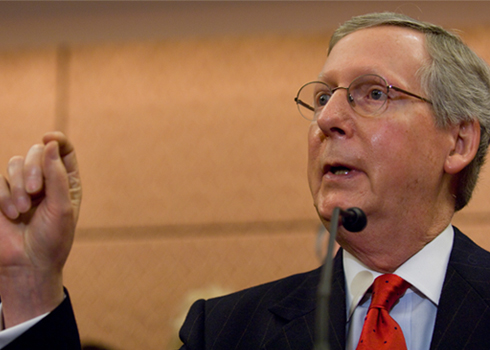If Senate Republican efforts to carpet bomb the health care reconciliation bill with technical objections fails they’ll have basically nothing to show for their last two weeks of rhetorical bluster. And in preparation for that, they’re preparing to accuse Senate parliamentarian Alan Frumin of partisanship in the event that he steamrolls their complaints about the package.
“We’ll see what the parliamentarian rules, and whether he becomes a player in this exercise or a–truly–a referee,” Senate Minority Leader Mitch McConnell told reporters at his weekly press conference today.
The parliamentarian–a non-partisan official, appointed when Republicans were in power–will play a key role in the reconciliation process. Unless the Senate chair (usually the Vice President) overrules him, he’s the person who determines whether every provision in the bill meets the strict rules of the reconciliation. Republicans have threatened to raise what are known as points of order against various provisions, if they think they violate the rules.
Democrats today seemed confident that they’ve made their bill practically bullet proof–that nothing in the package violates the so-called “Byrd rules” which hold that reconciliation provisions must be purely budgetary. Senate Budget Committee Chairman Kent Conrad told reporters after a Democratic caucus lunch this afternoon that in recent days they’ve “found additional precedent that supports our view that nothing is Byrdable.”
Senate Finance Committee Chairman Max Baucus was almost as confident.
“Anything is possible. We’ve constructed this thing so well … maybe one or two [changes will have to be made] but they’re so minor they’re almost not even worth mentioning,” Baucus told reporters walking into the lunch.
House and Senate Democrats put weeks into crafting a reconciliation bill that will meet parliamentary muster. If any changes are made during the process it will have to go back to the House for another vote. The main hope for Democrats is that that won’t be necessary–that the bill will pass the Senate without a single change. But failing that, the next best option for Dems is that the changes will be so minor that the House will have no problem voting on it again.
Republicans will characterize that differently, though. Sen. John Barrasso (R-WY) last night put it pretty nakedly. The parliamentarian, he said, “works for Harry Reid.”






